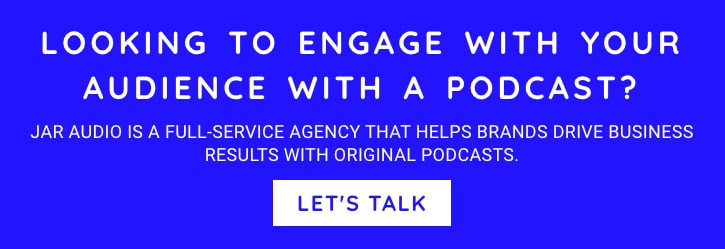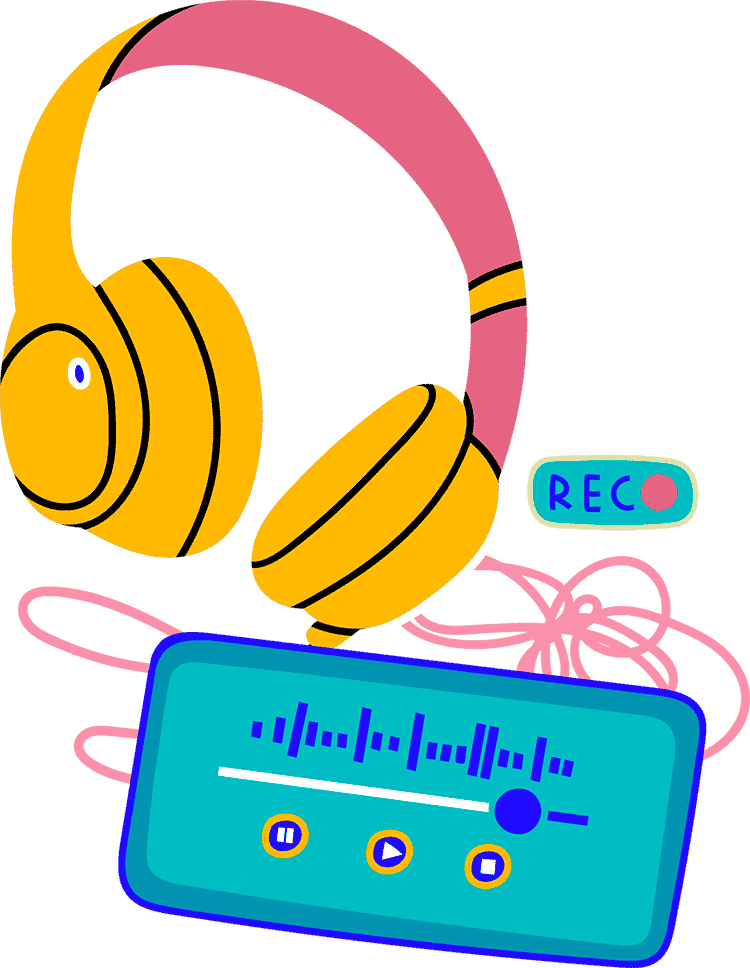Discover Innovative Corporate Podcast Formats to Elevate Your Branded Audio Content
In last week’s post, we explored five popular corporate podcast formats that could be a fit for your brand’s show. Many companies are eager to start a podcast, and these formats can offer a perfect starting point.
But what if you’re planning to take more risks and break the mold in pursuit of your content marketing goals?
First of all, kudos! Corporate podcast formats don’t come with many hard-and-fast rules, and we encourage the brands we work with to embrace this flexibility.
So, in the spirit of creativity, we’d like to walk you through four killer podcast formats that are a little less common but seriously rich in potential.
You’ll find a breakdown of each of these categories below…
- Narrative Nonfiction
- Narrative Fiction
- Nonlinear
- Mini-Episodes
Stay with us. It’s time to find the perfect fit for your branded show.
1. Narrative Nonfiction
This category overlaps with the documentary format we covered last week, but there are several ways you can approach this kind of show.
A narrative nonfiction series may be personal, creative, or rich in editorial. Sometimes it’s investigative — but it’s always rooted in reality, no matter the genre.
This format relies heavily on in-studio recording but will generally also include other types of content such as streeters, field recordings, or archival sound.
Sometimes, narrative nonfiction creators also use scripted dialogue or reenactments to push their story along.
Each content type is woven together by a skilled production team for an end result that’s dynamic, cohesive, and totally immersive — with a distinct story arc and flow.
To hear how this format sounds, you can check out Nice Genes! by Genome BC, a series that explores the fascinating world of genetics.
2. Narrative Fiction
Also referred to as drama or fiction podcasts, these creative concepts are rooted in conventional storytelling — not the real world.
They are generally based around a full-fledged script, but some shows also include improv, which can be incredibly effective when it’s done well.
Made with the help of voice actors, a Foley team, and A-grade immersive sound, this is the ultimate escapist format.
In fact, a great fiction series has the power to whisk your listeners away and into a whole new world.
To experience this style for yourself, you may want to check out Murder in HR, a gripping drama that explores the dark side of corporate life.
3. Nonlinear
This is perhaps the most experimental form of podcast format there is.
The defining quality of a nonlinear podcast is that it doesn’t have a traditional approach to structure — or a distinct beginning, middle, and end.
A nonlinear series may be impressionistic or abstract, but it needs to be seriously immersive to maintain listener engagement.
It may include ambient sounds, streeters, field recordings, music, or interview segments.
Several elements are often woven together to create what we call an audio montage.
While traditional storytelling is a time-tested concept, the nonlinear format shows potential to truly stir things up.
When executed correctly, this format feels fresh and packs the power to attract and retain listeners because of its rebellious and unconventional approach.
Remember, you’re looking to make waves in a sea of more than 2 million other shows — but you won’t want to do this without help from the pros.
For an example, listen to Infernal Communication by Staffbase, which dives into the complexities of workplace communication.
4. Mini-Episodes
When we think of podcasts, we usually jump straight to long-form content — which makes perfect sense when we look at the numbers.
Most podcast episodes hover between 30 minutes and an hour in length, but we’ve seen shorter episodes work beautifully for several successful shows.
To put this in context, let’s take a look at one of the highest performing examples, the informative hit series Stuff You Should Know.
Here’s how this show currently ranks on Chartable:
- It’s in spot number four on the US chart for Society & Culture
- It’s the fifth most popular series in Canada
- And it’s the 11th most popular series in the US overall (Chartable) (Chartable)
Episodes range in length, but this show owes its success in part to what the creators call “Short Stuff” — a series of mini-episodes that land around the ten-minute mark.
For an example of short-form content in the branded podcast world, let’s turn to This Is Small Business by Amazon, which explores entrepreneurial journeys and tips in concise episodes at times.
There are plenty of good reasons to experiment with episode length and follow in the footsteps of these high-performing shows.
Shorter episodes have the power to:
- Lower your budget
- Attract time-conscious listeners
- Offer value with minimal investment
- And add variety and dimension to your show
Depending on your niche, goals, and content marketing budget, you may choose to integrate short-form content, or stick to mini-episodes across the board.
The Perfect Fit
Ultimately, there is no right or wrong podcast format. They all have great qualities, and no single concept can guarantee the success of your show.
If you need help choosing, an experienced podcast production team should be able to guide you to the ideal format for your niche, audience, and content marketing goals.
To dive deeper into this topic, you can check out this list of five popular formats for your corporate show.
5 Key Takeaways on Corporate Podcast Formats:
- Embrace Creativity: Podcasts offer a vast landscape of creative opportunities, allowing brands to break the mold and try innovative formats beyond traditional interviews.
- Narrative Nonfiction: This format involves in-studio recordings, field content, and scripted dialogues to create immersive, reality-rooted stories.
- Narrative Fiction: Fiction podcasts use voice actors, scripts, and immersive soundscapes to transport listeners into new worlds.
- Nonlinear Formats: These experimental podcasts break traditional structures, using various sound elements to create engaging audio montages.
- Mini-Episodes: Short-form content can attract time-conscious listeners, reduce production costs, and add variety to a podcast series.

Jen Moss is the Co-Founder and and Chief Creative Officer of JAR Audio. As JAR’s podcast “doula”, collaborating with enterprise brands to bring great podcasts into the world. With a background spanning CBC Radio, Canada’s National Film Board Digital Studio, Vancouver’s Roundhouse Radio and the University of British Columbia, she guides the creation of captivating podcasts at JAR.




